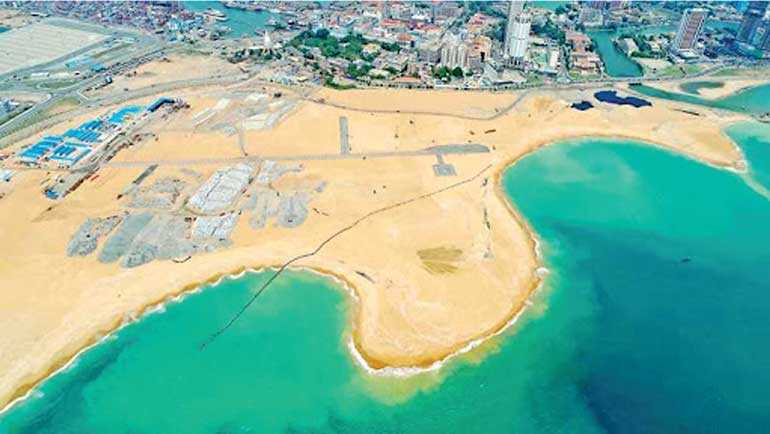Sunday Feb 15, 2026
Sunday Feb 15, 2026
Wednesday, 28 April 2021 00:00 - - {{hitsCtrl.values.hits}}

The creation of the Colombo Port City SEZ will be a positive turning point for Sri Lanka’s economic trajectory, place on the world stage and role in geopolitics. However, what is crucial now is that the mechanisms and frameworks necessary for the good and efficient governance of this SEZ are laid down fairly, with the appropriate checks and balances to ensure that Sri Lanka, Sri Lankans and the foreign investors who choose this investment city enjoy the best possible chance at global success
 Whilst special economic zones are nothing new in Sri Lanka, the proposed Port City Special Economic Zone will truly harness the full potential that such mechanisms can provide, especially for financial services.
Whilst special economic zones are nothing new in Sri Lanka, the proposed Port City Special Economic Zone will truly harness the full potential that such mechanisms can provide, especially for financial services.
In order to create and provide sophisticated, deep and liquid financial markets and services, there has to be an innovative, flexible and participant friendly framework in order to provide a conducive environment for businesses to carry out their services, unhindered.
In the past, many attempts at gradual movements towards a free and open financial system have been made in Sri Lanka, without much success. The new Colombo Port City SEZ will create the largest ‘mixed free trade zone’ in the island, thus providing the opportunity for Sri Lanka to avail itself of all the benefits of financial and economic liberalisation, whilst still insulating the mainstream economy. Such a move will also provide the impetus for the creation of a true global financial centre in South Asia, which is a crucial need of the hour.
Given that exchange and or capital controls, which are prevalent in the rest of Sri Lanka, will not be applicable in the Colombo Port City SEZ, investors and service providers will have the freedom to move capital around in a streamlined manner.
Presently, moving investment capital into and out of Sri Lanka is a relatively time consuming process, requiring various clearances and other procedures. However, because capital flows into and out of the proposed SEZ will not enter the mainstream Sri Lankan financial system, the need will be limited for such stringent controls.
Ease of Doing Business
One of the major impediments to economic development and foreign direct investment into Sri Lanka is its low score in terms of ease of doing business. We are now only ahead of Pakistan, the Maldives and Afghanistan in the region, and rank 99th in the world out of 190.
The mechanisms proposed for the governing of the new SEZ will help streamline policies and make it easier to do business in Sri Lanka. Furthermore, the more investor friendly, business friendly and convenient policies and practices will likely soon make a positive impact to rest of the Sri Lankan economy.
Sophisticated financial products and services
Sri Lanka’s financial system remains relatively conservative. This is largely due to the aforementioned controls and resulting lack of liquidity, combined with restrictive regulations. The proposed SEZ will create a free and open environment for financial services providers and their ancillary service providers. It will also very likely create a platform, for companies to consider listing their securities for trading in Sri Lanka.
The fact that Sri Lanka is geographically well placed in the global financial services sphere is an added advantage. We can easily position ourselves, first as a conduit and thereafter as a mainstream financial services centre between Dubai, Singapore and Hong Kong. This is a perfect opportunity to exploit this unique advantage.
Providing an offshore dollar denominated trading platform devoid of exchange control regulations will create excellent opportunities for firms from China, and the rest of Asia, to seek single or dual listing opportunities. The proposed SEZ will act as a catalyst to attract equity, debt and even derivative trading indices to seek listings in the proposed SEZ.
A glance at Dubai’s DIFC
A great and flourishing example of a similar project is the Dubai International Financial Centre (DIFC). It is a region within Dubai, but separate from it in terms of regulatory, judicial and financial frameworks. It offers international businesses many advantages over operating within Dubai mainland such as a world class regulatory environment, ability for 100% foreign ownership of companies (not allowed in Dubai-mainland) and, tax benefits. As a result, they are extremely successful in attracting world leading financial institutions and Multi-National Corporations to establish their regional presence within the DIFC.
The proposed Colombo Port City SEZ will provide similar benefits to investors, while also providing Sri Lanka with the crucial benefit of being able to stimulate and grow our economy, whilst still keeping our mainstream economy separated. As we see the benefits of a more streamlined financial and regulatory framework at work, this model could then be used to drive reforms across Sri Lanka in the future.
Conclusion
The creation of the Colombo Port City SEZ will be a positive turning point for Sri Lanka’s economic trajectory, place on the world stage and role in geopolitics. However, what is crucial now is that the mechanisms and frameworks necessary for the good and efficient governance of this SEZ are laid down fairly, with the appropriate checks and balances to ensure that Sri Lanka, Sri Lankans and the foreign investors who choose this investment city enjoy the best possible chance at global success.
It is therefore imperative that we, focus on the facts and realities and buy-in to this game changing opportunity. Doing so is a prerequisite to fulfilling the quest to place Sri Lanka on par with the key financial centres of the world, competing as an equal with the likes of Singapore, Dubai, London and New York.
For this to happen, the laws governing the proposed SEZ Authority must be congruent with the constitution and the territorial integrity of Sri Lanka whilst being forward looking and inviting investment capital.